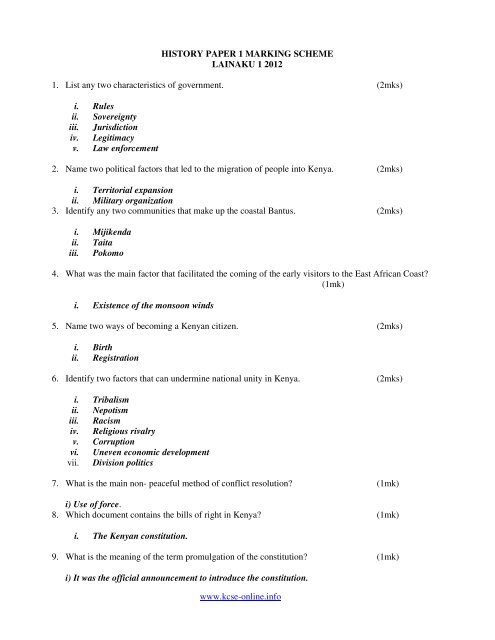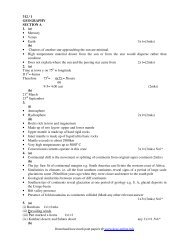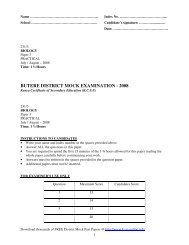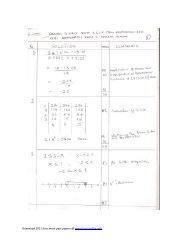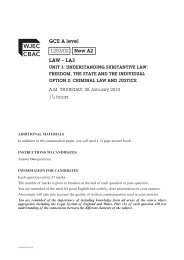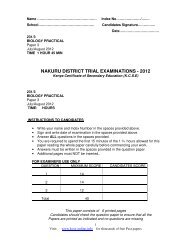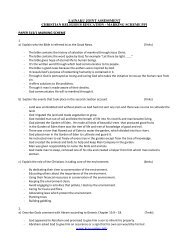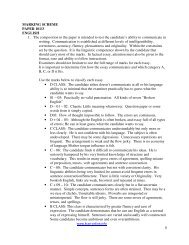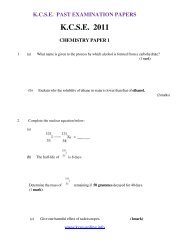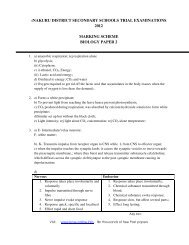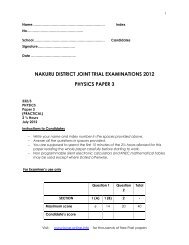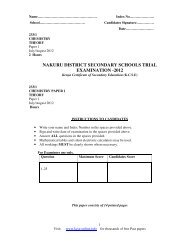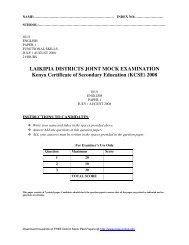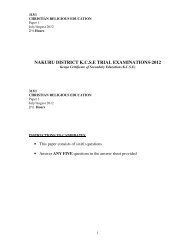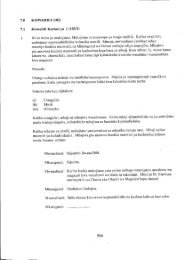www.kcse-online.info HISTORY PAPER 1 MARKING SCHEME ...
www.kcse-online.info HISTORY PAPER 1 MARKING SCHEME ...
www.kcse-online.info HISTORY PAPER 1 MARKING SCHEME ...
Create successful ePaper yourself
Turn your PDF publications into a flip-book with our unique Google optimized e-Paper software.
<strong>HISTORY</strong> <strong>PAPER</strong> 1 <strong>MARKING</strong> <strong>SCHEME</strong><br />
LAINAKU 1 2012<br />
1. List any two characteristics of government. (2mks)<br />
i. Rules<br />
ii. Sovereignty<br />
iii. Jurisdiction<br />
iv. Legitimacy<br />
v. Law enforcement<br />
2. Name two political factors that led to the migration of people into Kenya. (2mks)<br />
i. Territorial expansion<br />
ii. Military organization<br />
3. Identify any two communities that make up the coastal Bantus. (2mks)<br />
i. Mijikenda<br />
ii. Taita<br />
iii. Pokomo<br />
4. What was the main factor that facilitated the coming of the early visitors to the East African Coast?<br />
(1mk)<br />
i. Existence of the monsoon winds<br />
5. Name two ways of becoming a Kenyan citizen. (2mks)<br />
i. Birth<br />
ii. Registration<br />
6. Identify two factors that can undermine national unity in Kenya. (2mks)<br />
i. Tribalism<br />
ii. Nepotism<br />
iii. Racism<br />
iv. Religious rivalry<br />
v. Corruption<br />
vi. Uneven economic development<br />
vii. Division politics<br />
7. What is the main non- peaceful method of conflict resolution? (1mk)<br />
i) Use of force.<br />
8. Which document contains the bills of right in Kenya? (1mk)<br />
i. The Kenyan constitution.<br />
9. What is the meaning of the term promulgation of the constitution? (1mk)<br />
i) It was the official announcement to introduce the constitution.<br />
<strong>www</strong>.<strong>kcse</strong>-<strong>online</strong>.<strong>info</strong>
10. Name two levels of government as provided in the new constitution. (2mks)<br />
i. County Government<br />
ii. National Government<br />
11. Identify two economic reasons that made Africans to move to urban centres during the colonial period<br />
in Kenya.<br />
(2mks)<br />
i. Land alienation<br />
ii. Escape from forced labour<br />
iii. Trade<br />
12. State one reason why Africans were reluctant to accept western medicine in Kenya during the colonial<br />
period.<br />
(1mk)<br />
i. Deep rooted fear in operation treatment.<br />
ii. When the government introduced vaccination campaign some Africans saw it as a way of<br />
being tortured and they went into hiding.<br />
iii. Africans had belief in traditional medicies.<br />
13. Name the first president of Kenya African National Union. (1mk)<br />
i. James Gichuru<br />
14. State two characteristics of political organizations in Kenya after 1945. (2mks)<br />
i. They were more radical and aggressive in their demands.<br />
ii. They had a national outlook involved people from all ethnic backgrounds.<br />
iii. They demanded for full political independence.<br />
15. Which is the highest ranked court in Kenya’s judicial system under the new constitution.<br />
(1mk)<br />
i. The supreme court<br />
16. Name the environmental organization founded by Wangari Mathai. (1mk)<br />
i. Green belt movement<br />
17. State the main role of the Attorney General as the ex-official Member of Parliament. (1mk)<br />
i. Advise parliament and the government on legal matters.<br />
SECTION B (45MKS)<br />
ANSWER THREE QUESTIONS FROM SECTION<br />
18. a) State five results of the migration and settlement of Bantus in Kenya. (5mks)<br />
i. Spread of iron working to other parts of Kenya.<br />
ii. Led to increased population<br />
iii. Led to increased inter community conflict.<br />
iv. Trading activities intensified on Bantus exchanged their iron products with other<br />
communities.<br />
v. Led to the spread of agricultural practices in Kenya.<br />
vi. Led to population redistribution e.g Dorobo moved to forested areas.<br />
<strong>www</strong>.<strong>kcse</strong>-<strong>online</strong>.<strong>info</strong>
vii.<br />
viii.<br />
ix.<br />
Displacement of some communities was also realized e.g Abagusii displaced by the Luo,<br />
cushites were displaced by Agikuyu in central Kenya.<br />
Inter-marriages between the Bantu communities and other groups.<br />
Exchange of knowledge and skills e.g many Bantus adopted the ageset system circumcision<br />
from the southern cushites.<br />
b) Describe the political organization of the Akamba during the pre-colonial period.<br />
(10mks)<br />
i. Practised a decentralized system of rule/council of elders.<br />
ii. Homestead (Musyi) war the smallest political unit.<br />
iii. Akamba had a territorial group comprised of several families called the clan.<br />
iv. The elders were ranked according to seniority<br />
Medium elders – Ntehe – helped in administrator<br />
Full elders – Atumia ma kivalo – acted as judge<br />
Senior elders – Atumia ma thembo - religion<br />
v. Had age set system for defense purpose/security.<br />
vi. Council of elders were also religious leaders.<br />
19. a) State five factors that led Seyyid Said to transfer his capital from Muscat to Zanzibar.<br />
(5mks)<br />
i. The climate in Zanzibar was pleasant compared to Muscat which was hot and dry throughout<br />
the year.<br />
ii. The need to control the towns along the East African Coast more effectively.<br />
iii. Zanzibar was a wide deep and well sheltered harbor in which ships could anchor.<br />
iv. Zanzibar had fertile soils for the cultivation of cloves.<br />
v. Zanzibar’s strategic position was convenient for trade with the mainland.<br />
vi. Zanzibar had clean and sweet water for drinking.<br />
b) Explain six effects of slave trade on the people of East Africa. (10mks)<br />
i. Africans subjected to untold sufferings and misery during slave raids and trade.<br />
ii. Depopulation of the interior of East Africa.<br />
iii. Led to fear and suspicion among the people.<br />
iv. Warfare increased due to slave raid.<br />
v. Undermined traditional industries as those with such skills were taken as slaves.<br />
vi. The use of slaves as porters promoted the trade in ivory and copper.<br />
20. a) State three reasons for convening the 2 nd Lancaster House Conference. (3mks)<br />
i. To draw independent constitution.<br />
ii. To sort out the difference between KANU and KADU.<br />
iii. To deal with the final touches of granting Kenya independence.<br />
b) Explain six provisions of the independence constitution in Kenya. (12mks)<br />
i. Provided the three arms of government namely; Judicial, Executive and Legislative.<br />
ii. Regional type of government.<br />
iii. Sharing power between KANU & KADU.<br />
iv. Provide the post of governor General who was the head of state.<br />
<strong>www</strong>.<strong>kcse</strong>-<strong>online</strong>.<strong>info</strong>
v. National Assembly was bicameral.<br />
vi. Prime minister was the head of government.<br />
vii. Gave judiciary authority to interpret law.<br />
viii. Parliamentary form of government.<br />
ix. Provided a Bill of Rights which stipulated the rights and freedom of citizens.<br />
x. Establishment of independent public services commission.<br />
21. a) Give five reasons for the rise of independent churches and schools. (5mks)<br />
i. Africans were unhappy with westernizing influence of Christian missionaries.<br />
ii. Africans felt that mission education was inadequate.<br />
iii. They were started by Africans who claimed to have received divine calling.<br />
iv. Africans felt that the scriptures were not properly interpreted.<br />
v. The mission churches did not accommodate traditional African expression of worship e.g.<br />
dancing, singing and beating drums.<br />
vi. Africans viewed missionaries as agents of colonization.<br />
vii. Forum for African meeting.<br />
b) Explain the role of women in the Mau Mau liberation movement in Kenya. (10mks)<br />
i. Participated in the armed struggle.<br />
ii. Coordinated rural networks to supply the provisions required.<br />
iii. Acted on spies for the mau mau.<br />
iv. Composed songs to mobilize people.<br />
v. Participated in oathing ceremonies.<br />
vi. Many women were imprisoned and detained.<br />
vii. Were tortured by colonial agents.<br />
SECTION C (30MKS)<br />
ANSWER ANY TWO QUESTIONS<br />
22. a) Identify five values of a good citizen in Kenya. (5mks)<br />
i. Respect for other people/their property.<br />
ii. Obedience to the laws of the county.<br />
iii. Participation in development projects.<br />
iv. Participation in the democratic/elected process.<br />
v. Being loyal/patriotic to one’s country.<br />
vi. Practicing integrity/honest when performing duties.<br />
vii. Reporting law breakers to the authorities.<br />
viii. Efficient use of national resources.<br />
b) Explain five peaceful methods of solving conflicts in Kenya. (10mks)<br />
i. Negotiation – Conflicting parties resolve their disputes cordially.<br />
ii. Mediation – a partial person helps the conflicting group parties to agree.<br />
iii. Arbitration – use of a third party to solve a dispute e.g. an elder, religious leader.<br />
iv. Litigation – filling of a lawsuit in a court of law.<br />
v. Diplomacy – Holding of peace talks to resolve international conflicts.<br />
vi. Use of force by international society i.e. peace keeping mission.<br />
vii. Sanctions – economic or social, the affected nations is isolated in order to force it to<br />
implement the decision made during conflict resolution conference.<br />
<strong>www</strong>.<strong>kcse</strong>-<strong>online</strong>.<strong>info</strong>
23. a) State three ways in which the judiciary ensures fairness in the administration of justice in Kenya.<br />
(3mks)<br />
i. The judicial service commission ensures that judges and magistrate discharge their duties<br />
without interference.<br />
ii. Suspected criminals are held innocent until proved guilty in a court of law- giving them a<br />
chance to be heard by the courts.<br />
iii. Persons found administering mob justice are liable to prosecution.<br />
iv. Suspected criminals are entitled to legal representation through an advocate of the high<br />
court.<br />
v. Suspected criminals of serious crimes such as murder are guaranteed free government<br />
services being represented by advocates.<br />
vi. Persons not satisfied with the verdict are allowed to appeal to higher court.<br />
b) Explain six factors that may undermine the administration of justice in Kenya. (12mks)<br />
i. High incidents of crime cause delay in the hearing and finalizing of cases.<br />
ii. Corrupt practices by some of the judiciary panel and police officers undermine fair<br />
administration of justice.<br />
iii. Political interference – Some suspected criminals may be freed on orders from about without<br />
following the laid down procedures.<br />
iv. Lack of awareness by the general public on their rights and legal procedures.<br />
v. Inadequate personnel and equipment for detecting and investigating acts of crime this may<br />
lead to inadequate evidence against acts of crime.<br />
vi. Some of the laws are too colonial/foreign to be relevant to the Kenyan context.<br />
vii. Unwillingness of some members of the public<br />
24. a) State three reasons why general elections are held in Kenya every five years. (3mks)<br />
i. It is a constitution requirement<br />
ii. To enable Kenyans to have a new government.<br />
iii. To enable Kenyans to elect leaders of their choice/confidence in.<br />
iv. To enable Kenyans to remove the non-performing leaders.<br />
v. To enable eligible Kenyans to exercise their democratic rights of voting i.e being elected.<br />
b) Explain six circumstances which may lead to a by-election in Kenya. (12mks)<br />
i. The death of a sitting member of parliament<br />
ii. It the sitting member of parliament defects from the party that sponsored him/her to<br />
parliament.<br />
iii. If a member of parliament is jailed for a term exceeding 12 months/life imprisonment.<br />
iv. Resignation of a sitting member of parliament.<br />
v. If a member is declared bankrupt by a court of law.<br />
vi. If a sitting member ceases to be a citizen of Kenya.<br />
vii. If the election results are nullified b the High Court /election offence<br />
viii. If the sitting member is elected the speaker of the National Assembly.<br />
ix. If a member misses eight consecutive parliamentary sitting without permission and the<br />
speaker declares the seat vacant.<br />
x. If a member is sentenced to death.<br />
xi. If a member is proved to be insane.<br />
<strong>www</strong>.<strong>kcse</strong>-<strong>online</strong>.<strong>info</strong>


